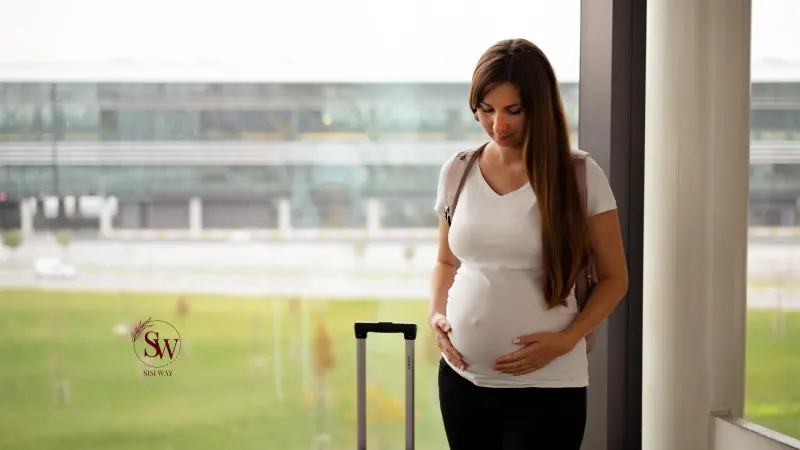Traveling During Second Trimester

Second Trimester Travel
Traveling during pregnancy can be an exciting and enriching experience, and the second trimester, often considered the “golden period,” is an ideal time for many expecting mothers to embark on a trip. With morning sickness subsiding and energy levels increasing, the second trimester offers a window of opportunity for travel. However, it’s important to prioritize your health and safety during this special time. In this article of sisiway, we will provide you with valuable insights and practical tips to help you navigate traveling during the second trimester with confidence and peace of mind.

Consult with Your Healthcare Provider:
Consulting with your healthcare provider is crucial when planning to travel during the second trimester of pregnancy. Your doctor has the expertise and knowledge of your specific medical history and pregnancy progress, allowing them to provide personalized advice and guidance tailored to your needs. They can assess any potential risks or complications that may arise from traveling and offer recommendations to ensure your safety and the well-being of your baby.
During the consultation, your doctor will consider various factors such as your overall health, any existing pregnancy complications, and the nature of your travel plans. They will advise you on whether it is safe for you to travel during this stage of pregnancy and provide specific guidelines to follow. They may also recommend necessary immunizations or medications based on your travel destination. By discussing your travel plans with your healthcare provider, you can make informed decisions and address any concerns or questions you may have, ensuring a smoother and more enjoyable travel experience during the second trimester.
Also read: Traveling During First Trimester of Pregnancy
Choose the Right Destination:
Choosing the right destination is crucial when planning to travel during the second trimester of pregnancy. Opt for destinations that offer a safe and supportive environment for pregnant women. Consider factors such as the availability and accessibility of quality healthcare facilities in the chosen location. It’s important to ensure that medical assistance will be readily available in case of any unexpected complications or emergencies. Research the destination’s healthcare infrastructure, including the availability of prenatal care, hospitals, and clinics. Additionally, consider the overall safety and stability of the destination, including factors such as political stability, security, and access to clean and safe environments.
Furthermore, take into account the climate and weather conditions of the destination. Extreme temperatures, high humidity, or other weather-related factors can impact your comfort and well-being during travel. It’s essential to choose a destination that aligns with your comfort level and minimizes potential discomfort. Consider destinations with moderate climates or plan your travel during seasons that offer milder weather conditions. By selecting the right destination, you can ensure a more pleasant and stress-free travel experience during the second trimester of pregnancy, prioritizing your comfort, safety, and overall well-being.
It should be noted that the importance of this matter becomes even more significant when traveling during the third trimester of pregnancy. However, it remains important during the second trimester as well.
Plan Your Activities Wisely:
When traveling during the second trimester of pregnancy, it’s important to plan your activities wisely to ensure your comfort and safety. While the second trimester is often considered a more comfortable period of pregnancy, it’s still essential to listen to your body and avoid any activities that could pose a risk to you or your baby. Opt for low-impact and gentle activities that allow you to enjoy your destination without overexertion. Sightseeing, leisurely walks, and cultural experiences are great options that provide opportunities for exploration while minimizing physical strain.
Avoid activities that involve excessive physical exertion, such as strenuous hikes, extreme sports, or activities with a high risk of falling or injury. Remember that your body is undergoing significant changes, and your balance and coordination may be slightly compromised. It’s also advisable to take regular breaks to rest, hydrate, and listen to your body’s cues for fatigue or discomfort. By planning your activities wisely, you can strike a balance between enjoying your travel experience and ensuring the well-being of both you and your baby.

Ensure Comfortable and Safe Travel:
Ensuring comfortable and safe travel is essential when venturing during the second trimester of pregnancy. Prioritize your comfort by choosing appropriate modes of transportation that accommodate your needs. If traveling by plane, consider selecting seats with extra legroom or near the aisle for easy access to the restroom. Dress in loose, breathable clothing and wear comfortable shoes to prevent swelling and promote circulation. Don’t forget to bring a cushion or pillow for added support, especially for long journeys.
To enhance safety during travel, take necessary precautions to reduce the risk of falls or accidents. Use handrails when available, take your time when walking or moving around, and avoid crowded or congested areas that may pose a higher risk of injury. It’s advisable to pack a small travel first-aid kit with essentials such as band-aids, antacids, and any medication prescribed by your doctor. Additionally, be mindful of your surroundings and follow any safety guidelines or advisories provided by your travel destination. By prioritizing both comfort and safety, you can enjoy a smoother and more enjoyable travel experience during the second trimester of pregnancy.
Read more: How to Travel Alone?

Pack Essential Items:
When packing for your travels during the second trimester of pregnancy, it’s important to include essential items that cater to your specific needs as an expectant mother. Start by packing comfortable clothing that accommodates your growing belly and allows for ease of movement. Opt for loose-fitting garments made from breathable fabrics to ensure maximum comfort during your journey. Don’t forget to include supportive footwear to prevent any discomfort or swelling.
In addition to clothing, remember to pack necessary items related to your pregnancy. This may include prenatal vitamins, any prescribed medications, and copies of your medical records. It’s also wise to carry a list of emergency contacts, including your healthcare provider’s information, as well as any relevant insurance details. Consider including a pregnancy pillow or cushion to enhance your comfort during long hours of sitting or sleeping. Lastly, pack snacks and water to keep yourself nourished and hydrated throughout your travels, as maintaining proper nutrition and hydration is crucial during pregnancy. By packing these essential items, you can ensure a more comfortable and stress-free journey during the second trimester.

Stay Hydrated and Prioritize Nutrition:
Staying hydrated and prioritizing nutrition are key considerations when traveling during the second trimester of pregnancy. It’s essential to drink plenty of water throughout your journey to prevent dehydration and support your overall well-being. Carry a refillable water bottle and make a conscious effort to drink water regularly, especially in warm climates or during activities that may cause you to sweat. Avoid excessive caffeine and sugary drinks, as they can dehydrate you and potentially affect your energy levels. Prioritize water as your primary beverage choice.
Additionally, prioritize nutrition by packing healthy snacks and aiming for balanced meals during your travels. Include a variety of fruits, vegetables, lean proteins, and whole grains in your meals to ensure you’re getting the necessary nutrients for both you and your baby. Pack portable and nutrient-dense snacks such as nuts, granola bars, or dried fruits to keep you fueled between meals. It’s also a good idea to research local food options at your destination, identifying restaurants or markets that offer healthy and pregnancy-friendly choices. By staying hydrated and prioritizing nutritious food, you can support your energy levels, maintain proper nutrition, and enjoy a more comfortable and enjoyable trip during the second trimester of pregnancy.

Listen to Your Body:
Listening to your body is paramount when traveling during the second trimester of pregnancy. Pay close attention to any signals or cues your body provides, as it’s important to prioritize your comfort and well-being. Take breaks and rest when needed, especially during long journeys or activities that may be physically demanding. If you feel fatigued, allow yourself time to recharge and regain your energy.
Moreover, be mindful of any discomfort or pain you may experience. Modify your activities or adjust your plans accordingly to avoid exacerbating any discomfort. It’s essential to communicate with your travel companions and inform them of your needs and limitations. Don’t hesitate to seek medical attention if you experience any unusual symptoms or have concerns about your health. Remember, every pregnancy is unique, and what works for others may not necessarily work for you. By listening to your body and responding to its needs, you can ensure a safer, more enjoyable travel experience during the second trimester of pregnancy.
is it safe to fly in second trimester?
Flying during the second trimester of pregnancy is generally considered safe for most women with uncomplicated pregnancies. The second trimester, typically spanning from week 14 to week 27, is often referred to as the “honeymoon phase” of pregnancy. During this time, many women experience a decrease in morning sickness, increased energy levels, and reduced discomfort. These factors make it a more favorable period for air travel compared to the first and third trimesters. However, it is important to consult with your healthcare provider before making any travel plans to ensure that flying is safe for you and your baby.
When flying during the second trimester, there are some precautions you should keep in mind to ensure a safe and comfortable journey. It’s recommended to choose direct flights whenever possible to minimize travel time and reduce the risk of fatigue. Additionally, it’s important to stay hydrated by drinking plenty of water and avoid excessive caffeine and sugary drinks. Wearing loose, comfortable clothing and supportive shoes can help promote circulation and reduce swelling. Taking regular walks and doing simple stretching exercises during the flight can also help prevent blood clots and keep your body active. Overall, with proper precautions and medical approval, flying during the second trimester can be a safe and enjoyable experience for expectant mothers.

Dangerous travel in the second trimester of pregnancy
There are several specific health conditions that could make second trimester travel unsafe for pregnant women. However, it’s important to note that individual circumstances can vary, and it’s always best to consult with a healthcare provider for personalized advice. Some health conditions that may pose risks during second trimester travel include:
-
Preterm labor history:
If a woman has a history of preterm labor or is at an increased risk of preterm birth, her healthcare provider may advise against traveling during the second trimester.
-
Gestational diabetes:
Women with gestational diabetes may require close monitoring of their blood sugar levels and dietary restrictions. Traveling may disrupt their routine and make it challenging to manage their condition effectively.
- Placental abnormalities:
Certain placental conditions, such as placenta previa or placental abruption, could increase the risk of bleeding or complications during travel.
-
High blood pressure or preeclampsia:
Women with high blood pressure or preeclampsia may require careful management of their condition, which can be challenging during travel, especially if access to medical care is limited.
-
Multiple pregnancies:
Women carrying multiple babies may be at a higher risk of complications, such as premature labor or gestational hypertension, which could make travel during the second trimester unsafe.
It’s crucial to discuss any existing health conditions and medical history with a healthcare provider to determine the safety of travel during the second trimester.
FAQ
- Is it safe to travel by air during the second trimester of pregnancy?
Air travel during the second trimester is generally considered safe for most women with uncomplicated pregnancies. The second trimester is often the most comfortable period, with a lower risk of morning sickness and fatigue. However, it’s important to consult with your healthcare provider before making any travel plans. They can evaluate your specific health condition and provide personalized advice based on your pregnancy progress.
- Are there any specific precautions to take when traveling during the second trimester?
When traveling during the second trimester, it’s important to take certain precautions for a safe and comfortable journey. Opt for direct flights whenever possible to minimize travel time and reduce fatigue. Stay hydrated by drinking plenty of water and avoid excessive caffeine and sugary drinks. Choose comfortable clothing and wear supportive shoes to promote circulation and reduce swelling. Take regular breaks to stretch and walk during long periods of sitting. Additionally, consider the destination’s climate and weather conditions, and plan activities that are suitable for your comfort level and physical well-being.
- Do I need to carry any medical documents while traveling during the second trimester?
It’s recommended to carry essential medical documents when traveling during the second trimester. This includes copies of your prenatal records, including ultrasound reports and any relevant medical history. It’s also wise to have a list of emergency contacts, including your healthcare provider’s information, as well as your health insurance details. If you require any specific medications, ensure you have an adequate supply and carry them in your hand luggage. Having these documents and information readily available can help in case of any medical emergencies or the need for medical care during your travel.
Conclusion:
Traveling during the second trimester can be a wonderful and memorable experience. By following these guidelines and prioritizing your health and safety, you can embark on a journey that allows you to relax, explore, and create cherished memories. Remember to consult with your healthcare provider, choose suitable destinations, plan wisely, and listen to your body throughout your travel adventure. Enjoy this special time and make the most of your second trimester travels!
Read more: When is a Woman Most Fertile



